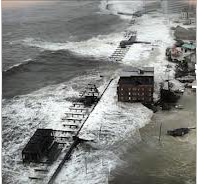Who pays for Nature’s increasing impacts?
Atlantic City rebuilds its boardwalk after storm destruction (happened).
New York builds a Hudson-wide storm barrier (Mayor Bloomberg’s plan).
And your town’s sewer system must be moved to avoid rising sea level (a whole lot of towns face this).
Who pays for these rising expenses? There are a few straws in the wind.
 A while back, when a waterside road in Norfolk developed problems similar to sea-level rise, residents supported their municipality’s decision to pay to raise the road. I wrote at the time I wouldn’t want to live – even on high ground – in a town that’s likely to bail out its shoreside residents.
A while back, when a waterside road in Norfolk developed problems similar to sea-level rise, residents supported their municipality’s decision to pay to raise the road. I wrote at the time I wouldn’t want to live – even on high ground – in a town that’s likely to bail out its shoreside residents.
Recently, Stanford Woods Institute for the Environment asked people the survey question “How much do you think the federal government should do to reduce the effects of rising sea level in the future – a great deal, quite a bit, some, a little, or nothing?” 45% said a great deal or quite a bit.
The same question was asked about state governments (53%), local governments (52%), and local businesses (48%). So, a majority expect these costs to be borne by government. And expectations are higher for state and local governments than for Washington.
Supplying a lot of disaster prevention and relief from municipal and state budgets may be the civilized thing to do. But think of the impact on local and state taxpayers! These inevitable additions to government budgets are why our free Where-To-Live reports give a lower Tax Grade to any town in one of the 20 coastal states, and especially those in coastal counties.
The biggest risk to those of us living there is not the growing danger to our property; it’s the growing pressures on local and state finances.



